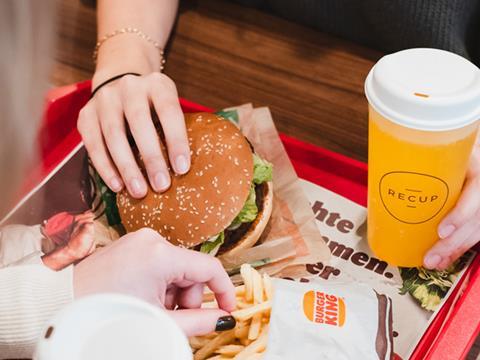
Reusable cups are now available at Burger King locations in Germany, with consumers making a deposit of €1.00 each to obtain one, before dropping it off and getting refunded at a distribution point post-use, ready for the cup to be washed and used again. We caught up with RECUP, Burger King’s partner on the project, to learn more.
First things first – can you give us a broad overview of this project and its key objectives?
RECUP is much more than just a project. With more than 21,000 dispensing points, we are a medium-sized company and at the same time the market leader for reusable containers in the food service industry.
Since January, guests at all 750 Burger King restaurants in Germany are able to order drinks, milkshakes and ice cream in reusable cups from RECUP – in the restaurant as well as on the go. After use, the cups can be returned to about 21,000 RECUP partners throughout Germany. With this partnership, Burger King and RECUP aim to help reduce waste and resources and save millions of single-use cups every year.
Let’s drill down into the finer details now. How does the project work in practice? What happens at each stage of the process?
Guests in all 750 Burger King restaurants in Germany can order their drinks, milkshakes, and ice cream in deposit RECUPs and with deposit lids. The reusable cups and lids can also be ordered at the ordering terminals (SOTs) or at the drive-in. For deposit cups and lids, customers pay a deposit fee of one euro, making a total deposit of two euros for a beverage with a lid.
The cups can be returned at any Burger King restaurant or at about 21,000 RECUP partners throughout Germany. After being returned, RECUPpartners clean the cups like normal dishes in the restaurant dishwashers and then return them to the cycle. RECUPs are 100% recyclable and free of BPA and harmful substances. One RECUP can replace up to 1,000 single-use cups over its lifetime.
How did the collaboration come about? What did Burger King’s brief to you look like, and why did they choose RECUP as a partner in the first place?
Reusable systems should be as convenient as possible so that end consumers are willing to use them. This means that consumers need to be able to borrow and return reusable cups at as many locations as possible. Also, only when a reusable cup remains in the cycle and is actually used multiple times, it can bring real advantages in terms of sustainability. Since RECUP is the market-leading reusable system in Germany and the 21,000 dispensing points make it convenient for customers to use the system, Burger King chose RECUP as a partner.
The EU’s recently-announced PPWD revisions focus in large part on the promotion of reuse systems. What is you view on the proposed revisions, and what do you make of the criticisms that are being levelled at this move?
In general, we have a quite positive view on the recent movements on the EU level. Turning the direction into legislation is a big step for the reusable landscape in the EU. Overall, we welcome the PPWR proposal and its ambition to support reuse systems, but together with the German reuse association we suggested several modifications in terms of quotas, targets and used wordings and definitions.
Whatever eventually happens with the revisions, it’s clear that reuse will eventually become more prevalent due to consumer and regulatory demands.
What can the packaging value chain do to promote reuse as a viable alternative to other packaging formats?
What we believe to be effective is to make reuse more convenient and accessible to consumers through a higher density in infrastructure. A reusable system works best when it is as easily accessible and convenient as possible. But we think that especially stricter regulations such as a single-use tax would effectively promote reuse as a viable alternative to other packaging formats.
If you liked this article, you might also enjoy:
McKinsey on whether or not on-pack sustainability claims affect consumer spending
A deep dive into the most important packaging sustainability trends and solutions














No comments yet